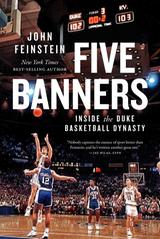 John Feinstein, "an indefatigable sportswriter" for the Washington Post and the author of more than 40 books, died March 13 at age 69, the New York Times reported. Feinstein's last column, about Michigan State men's college basketball coach Tom Izzo, appeared in the Post on the day of his death.
John Feinstein, "an indefatigable sportswriter" for the Washington Post and the author of more than 40 books, died March 13 at age 69, the New York Times reported. Feinstein's last column, about Michigan State men's college basketball coach Tom Izzo, appeared in the Post on the day of his death.
Feinstein's first book, A Season on the Brink: A Year with Bob Knight and the Indiana Hoosiers (1986), was a bestseller, but Knight didn't speak to him for eight years after its publication. In his column, Feinstein later wrote that the access Knight had given him helped make the book a success, "which has allowed me to pick and choose book topics for the past 38 years." The book was adapted into a TV movie in 2002, starring Brian Dennehy as Knight.
Feinstein wrote books on basketball, baseball, tennis, football, golf, the Olympics, and more. His most recent titles include two published last year: Five Banners: Inside the Duke Dynasty; and The Ancient Eight: College Football's Ivy League and the Game They Play Today. He also wrote novels for young readers, including Last Shot: A Final Four Mystery, which won an Edgar Award for best YA book in 2006.
His other works include A Season Inside: One Year in College Basketball (1988); Hard Courts: Real Life on the Professional Tennis Tour (1991); Living on the Black: Two Pitchers, Two Teams, One Season to Remember (2008); Let Me Tell You a Story: A Lifetime in the Game (2004); The First Major: The Inside Story of the Ryder Cup (2016); and A Good Walk Spoiled: Days And Nights on the PGA Tour (1995).
After graduating from Duke University with a bachelor's degree in history in 1977, Feinstein joined the Post as a summer intern in the sports department, and during his first two years at the paper worked as a night police reporter, then covered the police and the courts before returning to the sports desk.
In a guest column for the Washington Post, George Solomon, the paper's longtime sports editor, recalled Feinstein's drive: "One way or another, he was going to get what he was after, and if his bosses didn't always appreciate it, his readers usually did. To call him a managerial challenge would be an understatement. Often, Feinstein knew the right thing to do. Always, Feinstein believed he knew the right thing to do."

